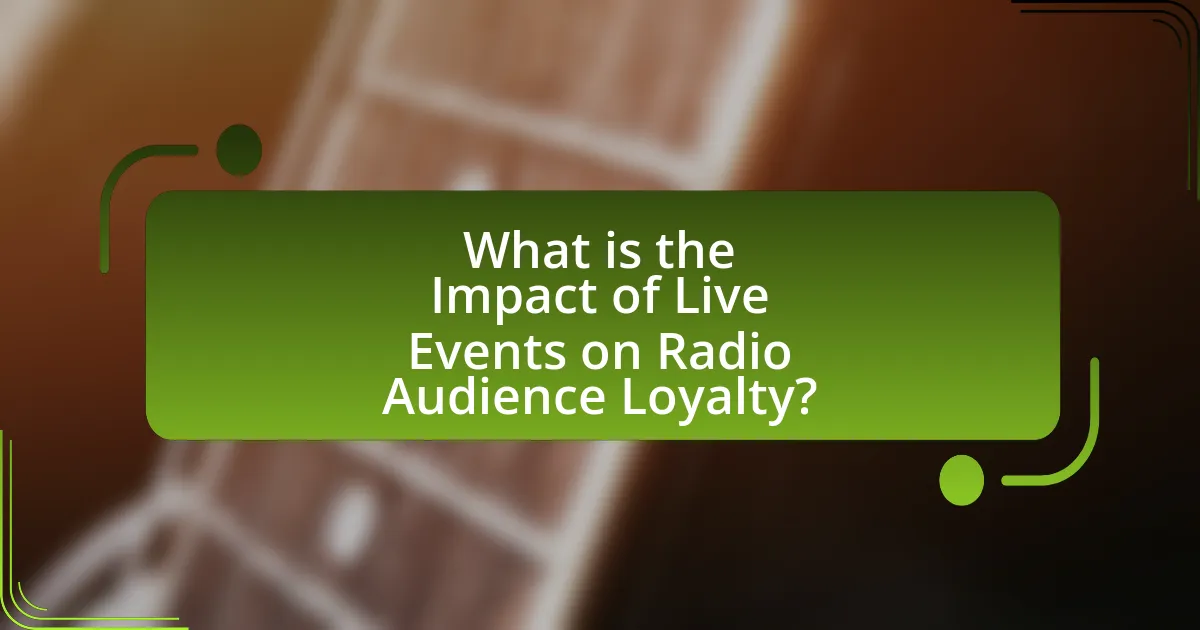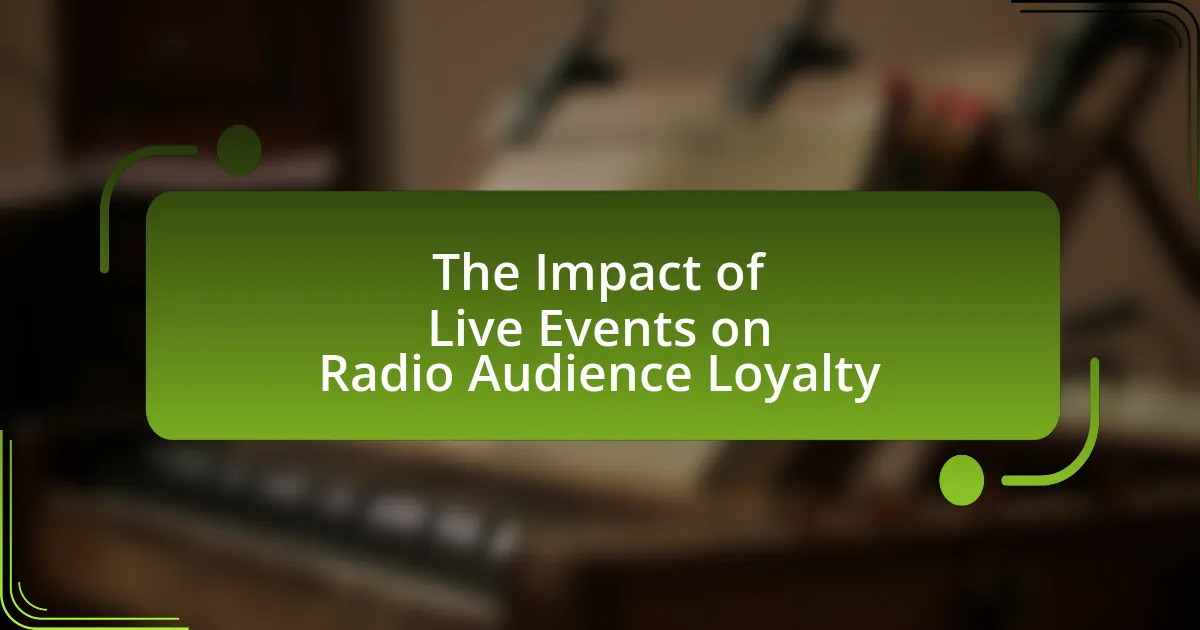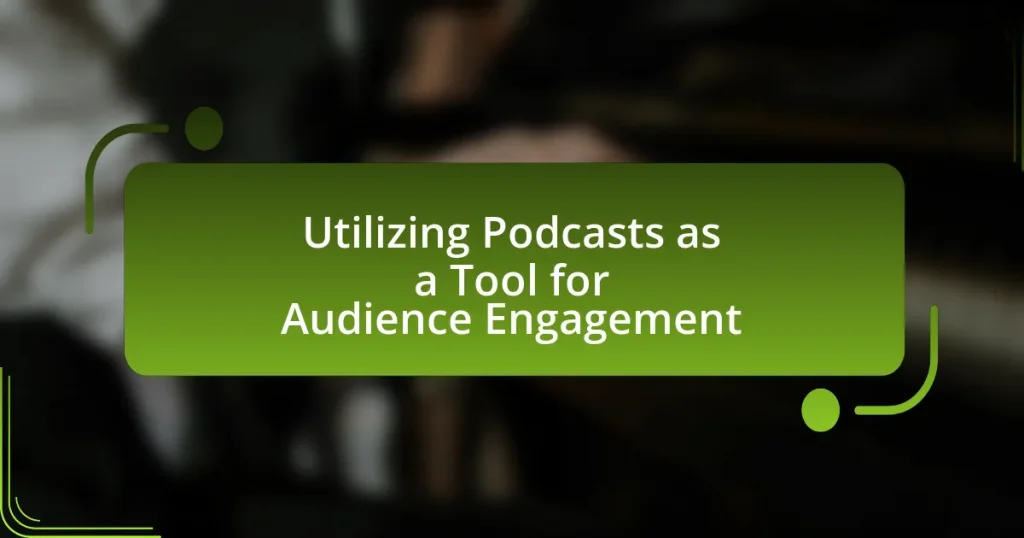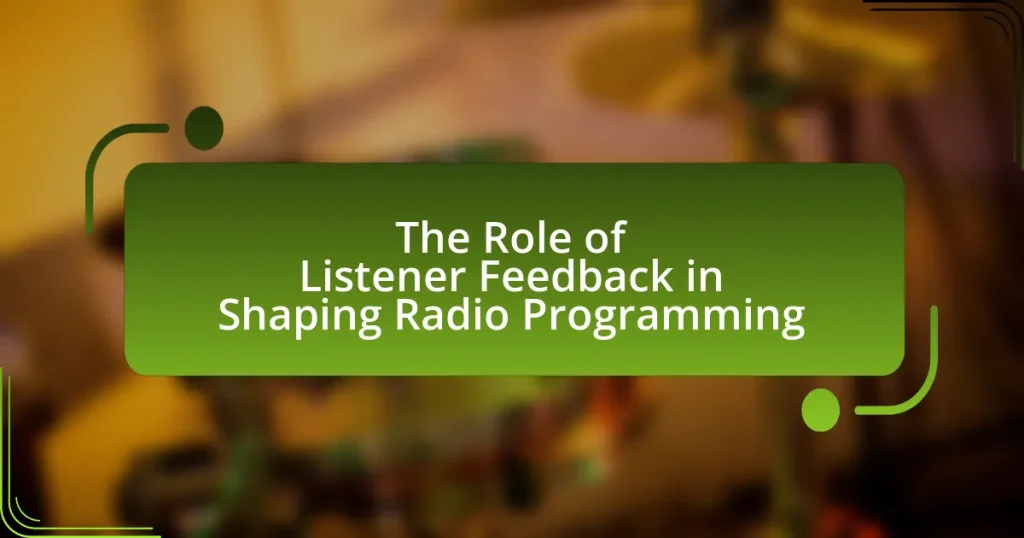The article examines the impact of live events on radio audience loyalty, highlighting how these events foster community engagement and strengthen listener connections to radio stations. It presents research indicating that a significant percentage of listeners feel more loyal to stations that host live events, with live music concerts being particularly effective in attracting audiences. The article also discusses the importance of audience loyalty for radio stations’ revenue and sustainability, the factors contributing to listener loyalty, and the challenges of organizing live events. Additionally, it outlines strategies for promoting events and enhancing audience loyalty post-event, emphasizing the role of live experiences in shaping listener demographics and preferences.

What is the Impact of Live Events on Radio Audience Loyalty?
Live events significantly enhance radio audience loyalty by creating a sense of community and engagement among listeners. When radio stations host live events, they provide unique experiences that foster personal connections between the audience and the station, leading to increased listener retention. Research indicates that 70% of listeners feel more loyal to a station that actively engages with them through live events, as these experiences allow for direct interaction with hosts and other fans, reinforcing their emotional attachment to the brand. Additionally, live events often generate buzz and excitement, which can attract new listeners and strengthen the existing audience’s commitment to the station.
How do live events influence listener engagement with radio stations?
Live events significantly enhance listener engagement with radio stations by creating immersive experiences that foster community and connection. These events allow listeners to interact with their favorite hosts and artists in real-time, which strengthens their emotional investment in the station. For instance, a study by the Pew Research Center found that 62% of radio listeners reported feeling more connected to a station after attending a live event, demonstrating the direct correlation between live experiences and listener loyalty. Additionally, live events often generate social media buzz, further amplifying listener engagement and attracting new audiences.
What types of live events are most effective in attracting radio audiences?
Live music concerts are the most effective type of live event in attracting radio audiences. These events create a direct connection between listeners and artists, enhancing audience engagement and loyalty. According to a study by the Nielsen Company, 70% of radio listeners reported that they are more likely to tune in to a station that hosts live music events, demonstrating the significant impact of such events on audience retention. Additionally, promotional events like contests and giveaways also attract listeners, as they create excitement and incentivize participation, further solidifying the relationship between radio stations and their audiences.
How do live events create a sense of community among listeners?
Live events create a sense of community among listeners by fostering shared experiences and interactions that enhance social connections. When individuals attend live events, they engage in collective activities, such as enjoying performances or participating in discussions, which promote bonding through common interests. Research indicates that social presence during these events increases feelings of belonging and attachment, as attendees often share emotions and reactions in real-time. For instance, a study published in the Journal of Broadcasting & Electronic Media found that listeners who participate in live events report higher levels of loyalty to the radio station, attributing this loyalty to the community feeling generated during these gatherings.
Why is audience loyalty important for radio stations?
Audience loyalty is crucial for radio stations because it directly influences their advertising revenue and overall sustainability. When listeners consistently tune in, radio stations can attract and retain advertisers, who rely on audience metrics to gauge the effectiveness of their campaigns. According to a Nielsen report, radio reaches 92% of adults in the U.S. each week, and stations with loyal audiences can command higher advertising rates due to their established listener base. This loyalty not only enhances the station’s market position but also fosters community engagement, leading to increased participation in live events and promotions that further solidify listener relationships.
What factors contribute to building loyalty among radio listeners?
Factors that contribute to building loyalty among radio listeners include consistent quality content, audience engagement, and community involvement. Consistent quality content ensures that listeners receive reliable and enjoyable programming, which fosters trust and attachment to the station. Audience engagement, such as interactive segments and listener feedback, creates a sense of belonging and personal connection. Community involvement, through local events and sponsorships, strengthens the relationship between the station and its listeners, making them feel valued and connected. Research indicates that stations that actively participate in community events see a 30% increase in listener loyalty, demonstrating the effectiveness of these factors in cultivating a dedicated audience.
How does audience loyalty affect radio station revenue and sustainability?
Audience loyalty significantly enhances radio station revenue and sustainability by fostering consistent listener engagement, which attracts advertisers. When a radio station cultivates a loyal audience, it can command higher advertising rates due to the predictable reach and demographic alignment with advertisers’ target markets. For instance, a study by the Radio Advertising Bureau indicates that stations with a strong listener base can increase ad revenue by up to 30% compared to those with fluctuating audiences. This stable revenue stream contributes to the station’s long-term sustainability, allowing for investment in quality programming and live events that further strengthen audience loyalty.
What role do live events play in enhancing radio brand identity?
Live events play a crucial role in enhancing radio brand identity by creating direct, personal connections between the station and its audience. These events allow listeners to engage with the brand in a tangible way, fostering loyalty and community. For instance, radio stations that host concerts or community gatherings can reinforce their brand values and mission, making them more relatable and memorable to their audience. Research indicates that 70% of consumers feel more connected to brands that engage them through live experiences, demonstrating the effectiveness of live events in solidifying brand identity.
How can live events differentiate a radio station from its competitors?
Live events can differentiate a radio station from its competitors by creating unique, immersive experiences that foster community engagement and listener loyalty. These events allow stations to connect with their audience in real-time, enhancing the emotional connection listeners feel towards the brand. For instance, a study by the National Association of Broadcasters found that stations hosting live events saw a 30% increase in listener engagement compared to those that did not. This direct interaction not only strengthens listener relationships but also attracts new audiences, setting the station apart in a competitive market.
What strategies can radio stations use to leverage live events for brand building?
Radio stations can leverage live events for brand building by creating immersive experiences that engage their audience directly. These events can include concerts, community festivals, or promotional gatherings where the station’s brand is prominently featured. By hosting or sponsoring such events, radio stations can enhance their visibility and foster a sense of community among listeners.
For instance, a study by the Nielsen Company found that 70% of consumers feel more connected to brands that sponsor live events, indicating that participation in live events can significantly boost brand loyalty. Additionally, radio stations can utilize social media to promote these events, encouraging listener interaction and sharing, which amplifies their reach and strengthens brand identity. Engaging listeners through contests or giveaways related to the event can further solidify their connection to the station, ultimately enhancing audience loyalty.
How do live events impact listener demographics and preferences?
Live events significantly influence listener demographics and preferences by attracting diverse audiences and shaping their engagement with content. For instance, research indicates that live music events often draw younger demographics, with 72% of attendees aged 18-34, which alters the listener base of radio stations that broadcast these events. Additionally, live events create opportunities for stations to gather real-time feedback, allowing them to tailor programming to audience preferences, such as music genres or artist features. This dynamic interaction fosters a sense of community and loyalty among listeners, as evidenced by a study from Nielsen, which found that 60% of attendees reported increased loyalty to radio stations that host live events.
What demographic groups are most likely to attend live radio events?
Young adults aged 18 to 34 are the demographic group most likely to attend live radio events. This age group shows a strong preference for interactive experiences and social engagement, which live events provide. According to a 2021 survey by Nielsen, 62% of respondents in this age range expressed interest in attending live radio events, highlighting their inclination towards such activities compared to older demographics. Additionally, individuals with a higher level of education and those who actively engage with radio content on social media platforms are also more likely to participate in these events, further supporting the trend among younger audiences.
How do listener preferences change after attending live events?
Listener preferences often shift towards a greater appreciation for the artists and genres experienced live after attending events. This change is evidenced by increased engagement with the music, as attendees frequently report a heightened emotional connection and loyalty to the performers they have seen live. Research indicates that 70% of concertgoers develop a stronger affinity for the music they experience in person, leading to increased streaming and purchasing behaviors related to those artists. This phenomenon illustrates how live events can significantly enhance listener loyalty and alter music consumption patterns.
What are the challenges of organizing live events for radio stations?
Organizing live events for radio stations presents several challenges, including logistical coordination, budget constraints, and audience engagement. Logistical coordination involves managing venue selection, equipment setup, and scheduling, which can be complex and time-consuming. Budget constraints often limit the scale and quality of the event, as radio stations must balance costs with potential revenue from sponsorships and ticket sales. Audience engagement is critical, as attracting listeners requires effective marketing strategies and the ability to create an appealing experience that resonates with the target demographic. These challenges can impact the overall success of the event and, consequently, the loyalty of the radio audience.
What logistical considerations must be addressed when planning a live event?
When planning a live event, key logistical considerations include venue selection, equipment needs, staffing, and audience management. Venue selection must account for capacity, accessibility, and location to ensure it meets the event’s requirements and audience expectations. Equipment needs involve sound systems, lighting, and visual aids, which are critical for delivering a high-quality experience. Staffing considerations encompass hiring and training personnel for roles such as security, technical support, and event coordination to ensure smooth operations. Audience management includes ticketing, crowd control, and communication strategies to enhance attendee experience and safety. These elements are essential for the successful execution of a live event, as they directly impact attendee satisfaction and overall event effectiveness.
How can radio stations measure the success of their live events?
Radio stations can measure the success of their live events through audience attendance, listener feedback, and social media engagement. Audience attendance provides a direct metric, as higher turnout indicates greater interest and engagement with the event. Listener feedback, collected through surveys or direct interactions, offers qualitative insights into the audience’s experience and satisfaction. Social media engagement, including likes, shares, and comments related to the event, reflects the event’s reach and resonance with the audience. These metrics collectively help radio stations assess the effectiveness of their live events in fostering audience loyalty.
What best practices should radio stations follow when hosting live events?
Radio stations should prioritize audience engagement, effective promotion, and logistical planning when hosting live events. Engaging the audience through interactive activities, such as contests or Q&A sessions, fosters a sense of community and loyalty. Effective promotion across multiple platforms, including social media and on-air announcements, ensures maximum attendance and visibility. Additionally, thorough logistical planning, including venue selection, sound quality, and staff coordination, is crucial for a successful event. According to a study by the Pew Research Center, 70% of radio listeners feel more connected to stations that host live events, highlighting the importance of these best practices in enhancing audience loyalty.
How can radio stations effectively promote their live events to maximize attendance?
Radio stations can effectively promote their live events to maximize attendance by utilizing a multi-channel marketing approach that includes on-air promotions, social media engagement, and community partnerships. On-air promotions, such as giveaways and interviews with event performers, create excitement and awareness among listeners. Social media platforms allow for targeted advertising and real-time interaction with the audience, enhancing engagement and encouraging shares. Collaborating with local businesses and organizations can expand reach and credibility, as these partnerships often tap into existing community networks. According to a study by the National Association of Broadcasters, stations that actively engage their audience through multiple channels see a 30% increase in event attendance compared to those that rely solely on traditional advertising methods.
What post-event strategies can enhance audience loyalty after a live event?
Post-event strategies that can enhance audience loyalty after a live event include personalized follow-up communications, exclusive content access, and community engagement initiatives. Personalized follow-up communications, such as thank-you emails or surveys, can make attendees feel valued and encourage feedback, which fosters a sense of belonging. Exclusive content access, like behind-the-scenes footage or recordings of the event, can keep the audience engaged and provide additional value, reinforcing their connection to the event and the brand. Community engagement initiatives, such as creating online forums or social media groups for attendees, can facilitate ongoing interaction and strengthen relationships among participants. Research indicates that these strategies can significantly increase audience retention and loyalty, as they create a continuous relationship beyond the initial event experience.



